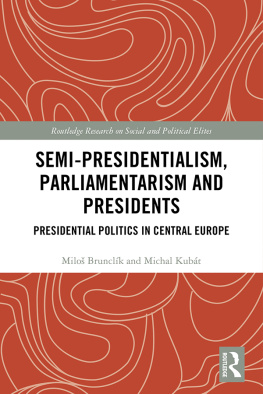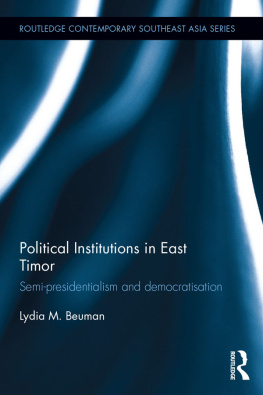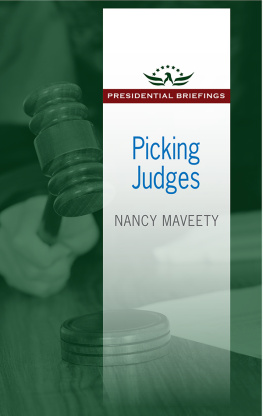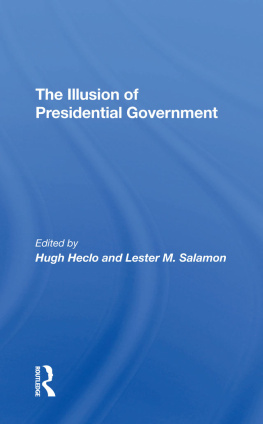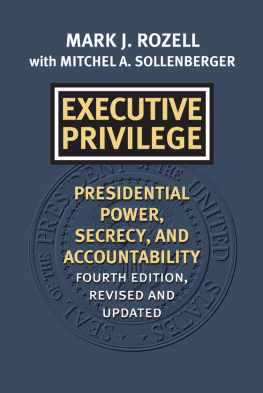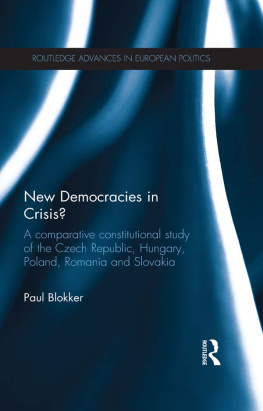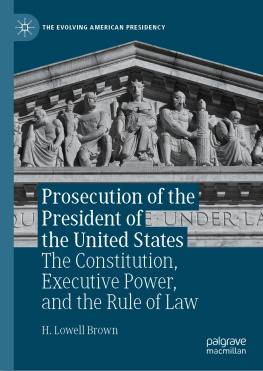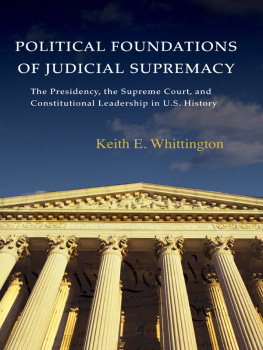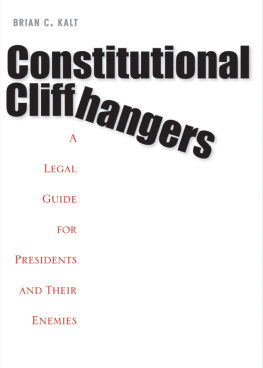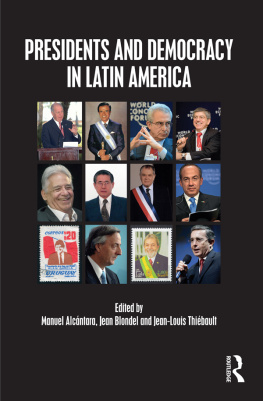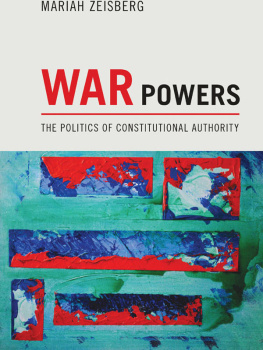Table of Contents
Pages
Semi-presidentialism, Parliamentarism and Presidents
The book analyzes the presidencies of three neighboring Central European countries Poland, the Czech Republic and Slovakia in the context of their interactions with cabinets (and prime ministers), parliaments and the constitutional courts, all which have proved crucial actors in the regions political and constitutional battles.
Using both institutional and behavioral perspectives along with an innovative definition of semi-presidentialism, the book argues that presidential powers rather than the mode of the election of the president are crucial to the functioning of the regimes and their classification into distinctive regime types. Focusing on intra-executive conflicts and the interaction of the president with other constitutional players, it argues that, regardless of the mode of the election of the president, regimes have traditionally been very similar not only in their institutional settings, but also in the way they function. Finally, it shows that Poland, the Czech Republic and Slovakia should be classified as parliamentary regimes.
This text will be of key interest to scholars and students of Central and East Europe studies/politics, post-Communist studies, presidential studies and more broadly to political elites and institutions, comparative politics and legislative studies.
Milo Brunclk is Assistant Professor at the Institute of Political Studies, Charles University, Prague, Czech Republic.
Michal Kubt is Associate Professor at the Institute of International Studies, Charles University, Prague, Czech Republic.
Routledge Research on Social and Political Elites
Series Editors: Keith Dowding and Patrick Dumont
Australian National University, Australia
Who are the elites that run the world? This series of books analyses who the elites are, how they rise and fall, the networks in which they operate and the effects they have on our lives.
The Selection of Ministers around the World
Edited by Keith Dowding and Patrick Dumont
Party Members and Activists
Edited by Emilie van Haute and Anika Gauja
Political Representation
Roles, representatives and the represented
Edited by Marc Bhlmann and Jan Fivaz
Ministerial Survival during Political and Cabinet Change
Foreign Affairs, Diplomacy and War
Alejandro Quiroz Flores
Government Formation and Minister Turnover in Presidential Cabinets
Comparative Analysis in the Americas
Edited by Marcelo Camerlo and Cecilia Martnez-Gallardo
The Selection of Politicians in Times of Crisis
Edited by Xavier Coller, Guillermo Cordero, and Antonio M. Jaime-Castillo
National Political Elites, European Integration and the Eurozone Crisis
Edited by Nicol Conti, Borbla Gncz and Jos Real-Dato
Semi-presidentialism, Parliamentarism and Presidents
Presidential Politics in Central Europe
Milo Brunclk and Michal Kubt
Semi-presidentialism, Parliamentarism and Presidents
Presidential Politics in Central Europe
Milo Brunclk and Michal Kubt

First published 2019
by Routledge
2 Park Square, Milton Park, Abingdon, Oxon OX14 4RN
and by Routledge
711 Third Avenue, New York, NY 10017
Routledge is an imprint of the Taylor & Francis Group, an informa business
2019 Milo Brunclk and Michal Kubt
The right of Milo Brunclk and Michal Kubt to be identified as authors of this work has been asserted by them in accordance with sections 77 and 78 of the Copyright, Designs and Patents Act 1988.
All rights reserved. No part of this book may be reprinted or reproduced or utilized in any form or by any electronic, mechanical, or other means, now known or hereafter invented, including photocopying and recording, or in any information storage or retrieval system, without permission in writing from the publishers.
Trademark notice: Product or corporate names may be trademarks or registered trademarks, and are used only for identification and explanation without intent to infringe.
British Library Cataloguing-in-Publication Data
A catalogue record for this book is available from the British Library
Library of Congress Cataloging-in-Publication Data
A catalog record has been requested for this book
ISBN: 978-1-138-05471-4 (hbk)
ISBN: 978-1-315-16645-2 (ebk)
Typeset in Times New Roman
by Wearset Ltd, Boldon, Tyne and Wear
Contents
Tables
Acknowledgments
This book was elaborated within the research project no. 15-01907S Does Direct Election Matter? Analyzing the Effect of Direct Election of President on the Working of the Political Regime in the Czech Republic, sponsored by the Czech Science Foundation. We would like to thank the following colleagues whose comments helped us improve the text of our book: Vt Hlouek and Lubomr Kopeek, who read through the whole text of the book and provided us with invaluable comments. We would also like to thank Olga Gyrfov, Jan Kysela, Veronika Oravcov, Marin Sekerk and Peter Sp, with whom we consulted on various particular issues covered in this book. Special thanks go to Jacob Maze, who proofread the text. While these scholars have saved us from numerous errors, we bear full responsibility for any mistakes found in this book.
Introduction
It has been more than a quarter of a century since the Central European countries covered in this book (i.e., Poland, the Czech Republic and Slovakia) took a turn towards democracy and (re-)established the institution of presidency as the formal head of state. Although three decades is by no means an exceptionally long period of time, at least from the perspective of more experienced, consolidated democracies, this stretch of time has opened up an opportunity to attempt to generalize some trends or patterns of presidential politics in the region. This is precisely what we aim to achieve in this book. However, we were not merely inspired by the time that has elapsed since this transition to democracy. Another source of motivation for putting this book together was a couple of ambiguities and puzzles regarding the presidents of Central Europe.
First, from the perspective of a conceptual and theoretical debate surrounding this issue, it is notable that Central European countries are treated as parliamentary regimes by one group of scholars, whereas other authors have come to regard Poland, the Czech Republic and Slovakia as semi-presidential regimes. This disparity is not a negligible detail in classifying democratic regime types but rather a recurring feature of comparative as well as individual case studies, which has had implications for the conceptualization of parliamentary regimes, including rationalized parliamentarism and semi-presidentialism, in addition to impacting the significance and effects of the popular elections of presidents in democratic regimes. Hence, among other things, we address this lack of consensus in classifying Central European regimes in this book.
Second, although the three countries in question have set up their constitutional frameworks independently, and subsequently modified their constitutional articles in regard to their presidents, since their successful transitions to democracy the regimes of the three countries have worked in a very similar fashion for most of the post-1989 era once we leave aside the authoritarian tendencies of the Slovak political regime in the 1990s as well as the short-lived experience of the Polish constitutional system with a powerful president in the early 1990s.

